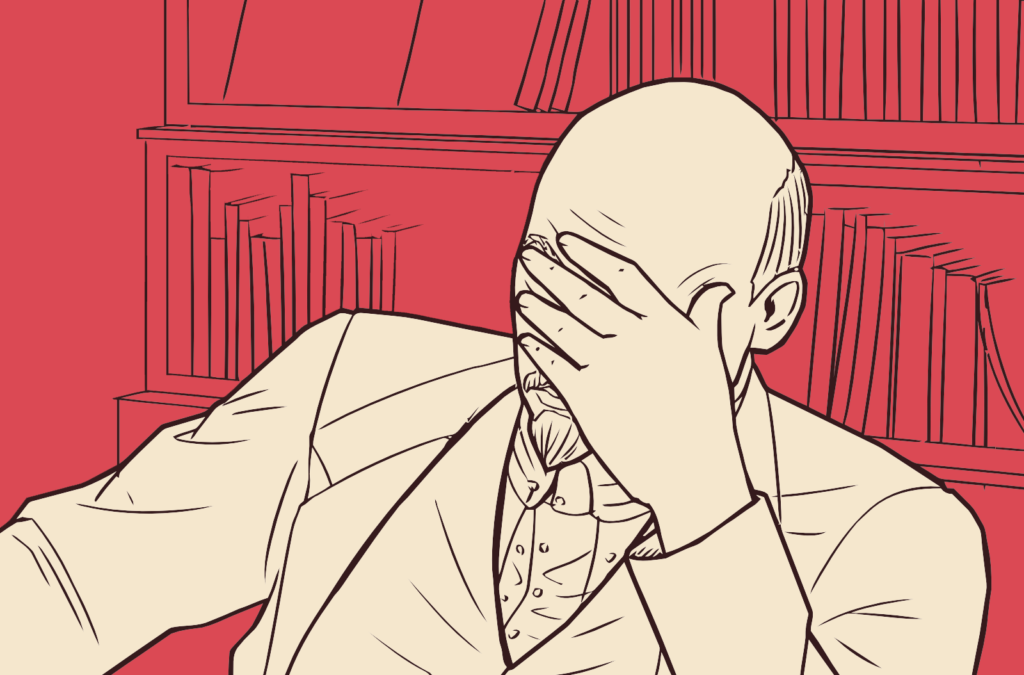With the 2020 U.S. presidential election already in full swing, we are already hearing the familiar clichés from liberals: that this is the “most important election in our lifetime” and that we must support the Democrats to defeat Donald Trump. Any left-wing criticism of the Democrats is met with a prompt demand to “shut up,” renounce our principles and get in line. Unfortunately, there are socialists and communists who not only repeat these liberal refrains, but also quote Lenin to justify supporting for the Democratic Party and to attack other socialists and communists as “dogmatists,” “purists” and “ultra-leftists.” The Lenin text most often cited as providing “loopholes” for radicals to abandon their principles and support the class enemy is “‘Left-Wing’ Communism: An Infantile Disorder” (LWC). This is, however, a gross misinterpretation of the purpose of Lenin’s LWC, which is not about rationalizing opportunism; rather, it is intended to help communists think seriously about strategy and tactics in order to successfully lead the working class.
Background
Lenin wrote LWC in April 1920, and it was published in Russian, German, English and French a few months later. At the second congress of the Communist International held in July, Lenin’s pamphlet was distributed to every delegate. The date of publication was no accident. Only in Russia had revolutionaries created a party that had taken power and created a new socialist order. After 1917, workers everywhere began looking to the Bolsheviks for inspiration and guidance. Revolutions and unrest swept across Europe, from Germany to Italy to Spain to Scotland. While none of these revolutions succeeded in replicating the Russian example, it was not unreasonable for Lenin to assume that a generalized revolutionary crisis still existed in Europe and that communists needed to be ready to take advantage of it.
The newly formed communist parties fired up by the Bolshevik example faced a number of problems. While they had the most militant and revolutionary workers in their ranks, these were still only a minority of the labor movement. By contrast, reformist socialist parties such as the German Social Democratic Party had millions of members and clearly held hegemony over the organized working class. But the reformist parties had betrayed their internationalist principles by supporting the bourgeoisie in World War I and remained obstacles to the overthrow of capitalism. For the communist parties, an immediate task was to win over the majority of sincere and honest workers who still followed the reformist parties.
Unfortunately, the communist parties, which were a mix of revolutionary and ultraleftist wings, were not up to the challenge of winning the working class or flexible enough to think strategically or tactically. These parties were characterized by a left communist trend represented by Amadeo Bordiga, Herman Gorter, Anton Pannekoek and Sylvia Pankhurst; this trend rejected any compromises or united front work with reformists, refused to participate in reactionary-led trade unions or in any parliamentary elections. While Lenin believed that left communism was a natural reaction of young, inexperienced and newly radicalized workers to the betrayals of the opportunistic socialists, he believed that it needed to be overcome with patient explanation. Otherwise, the left communist slogan of “no compromise, no maneuvers” was bound to lead to isolation, ossification and the revolution’s defeat.
No Compromise?
Lenin’s LWC was written in the hopes of breaking the left communists away from their dogmatic mind-set and helping them intervene in a situation in which possibilities were open to win the working class. Communists had to use the opportunities that existed in order to make the maximum gains and win over the masses, because any of them could lead to a revolutionary situation, and communists needed to take advantage of them all (all quotations from LWC are from the version available at the Marxist Internet Archive):
We do not and cannot know which spark—of the innumerable sparks that are flying around in all countries as a result of the economic and political world crisis—will kindle the conflagration, in the sense of specially rousing the masses, and we must, therefore, with the aid of our new, communist principles, set to work to “stir up” all and sundry, even the oldest, mustiest and seemingly hopeless spheres, for otherwise we shall not be able to cope with our tasks, we shall not be comprehensively prepared, we shall not master all arms and we shall not prepare ourselves to achieve either the victory over the bourgeoisie (which arranged all sides of social life—and has now disarranged them—in its bourgeois way) or the impending communist reorganization of every sphere of life after that victory.
To make this point, Lenin drew on the Bolshevik Revolution, which provided lessons that were truly international in scope. Among those lessons was the need for an independent and disciplined communist party guided by Marxist theory, which the Bolsheviks were able to win over to the masses:
On the other hand, having arisen on this granite theoretical foundation, Bolshevism passed through fifteen years (1903-17) of practical history which in wealth of experience has no equal anywhere else in the world. For no other country during these fifteen years had anything even approximating to this revolutionary experience, this rapid and varied succession of different forms of the movement—legal and illegal, peaceful and stormy, underground and open, circles and mass movements, parliamentary and terrorist. In no other country was there concentrated during so short a time such a wealth of forms, shades, and methods of struggle of all classes of modern society, and moreover, a struggle which, owing to the backwardness of the country and the severity of the tsarist yoke, matured with exceptional rapidity and assimilated most eagerly and successfully the appropriate “last word” of American and European political experience.
Lenin did not consider Marxist theory a dogma but a guide to action. It needed to be applied in diverse situations and circumstances, sometimes to lead the masses to attack or retreat, sometimes underground and sometimes openly, since the political terrain shifted communists themselves had to be flexible and adapt to it in order to carry out their work. In LWC, Lenin argued that the approach of “no compromises” on principle would prevent communists from being able to work flexibly: “The conclusion is clear: To reject compromises ‘on principle,’ to reject the admissibility of compromises in general, no matter of what kind, is childishness, which it is difficult even to take seriously.”
While Lenin said that communists sometimes needed to make compromises, this did not mean that all compromises were acceptable. Examples of principled compromises would be a union ending a strike, since labor contracts simply negotiate the level of exploitation but don’t end exploitation as a whole. The main question is whether the outcome of a strike helped to advance the interests and consciousness workers involved or set them back. An unprincipled compromise would be for communists in a strike selling out key demands or bureaucratic misleadership. But making the right choice, that is, determining the difference between a principled and unprincipled compromise, often means walking a fine line and needs a firm communist leadership tested in struggle:
There are compromises and compromises. One must be able to analyze the situation and the concrete conditions of each compromise, or of each variety of compromise. One must learn to distinguish between a man who gave the bandits money and firearms in order to lessen the damage they can do and facilitate their capture and execution, and a man who gives bandits money and firearms in order to share in the loot.
Considering that the task of revolution was so protracted and complicated, Lenin believed that communists could not rule out compromises such as retreating, taking advantage of conflicts among the enemy and working with even unstable allies without tying their hands in advance.
The Ballot Box
Lenin’s underlying argument in LWC called on communists to work wherever the masses are to be found. He believed that revolutionaries must at the same time relate to both the revolutionary minorities and the reformist majorities in the working-class movements. This work required running communist candidates in elections.
When it came to parliamentary institutions, Lenin understood that most workers still had illusions in them. Therefore, it was necessary for communists to run for elections with their own program, independently of the bourgeois parties. Unlike the reformists, communists did not believe in a parliamentary path to socialism. Rather, it was the task of communists in bourgeois parliaments to, as Lenin says in LWC, “wage a long and persistent struggle, undaunted by any difficulties, to expose, dissipate and overcome these prejudices.” In other words, communists in parliament needed to tear off the mask of bourgeois democracy and expose its true nature to the working class. So long as the working class and its vanguard are not strong enough to destroy parliament, it can be used as a platform for communists to spread their message. Ultimately the center of working-class activity remains in the factories and the streets, not at the ballot box.
Trade Unions
Many left communists opposed working in trade unions as well. Some of this involved a healthy instinct of distrust for the social democratic leaders, with their proven history of betraying the working class. Yet the unions held the majority of the organized working class, and by abandoning them, the left communists effectively abstained from the class struggle. Lenin knew quite well that the union leadership was reformist and reactionary, but he argued that this made it more necessary for communists to enter them. Communists should not cede any ground to such force. If communists entered the unions, this did not mean accepting their vacillating leadership, but taking on the difficult work inside the unions to expose their leaders before the masses:
It is precisely this absurd “theory” that Communists must not work in reactionary trade unions that brings out with the greatest clarity how frivolous is the attitude of the “Left” Communists towards the question of influencing “the masses,” and to what abuses they go in their vociferations about “the masses.” If you want to help “the masses” and to win the sympathy and support of “the masses,” you must not fear difficulties, you must not fear the pinpricks, chicanery, insults and persecution on the part of the “leaders” (who, being opportunists and social-chauvinists, are in most cases directly or indirectly connected with the bourgeoisie and the police), but must imperatively work wherever the masses are to be found.
Ultraleftism and Opportunism
Those who use LWC to justify opportunism can do this only by utterly misinterpreting his work and rejecting everything else he stood for. Lenin did not write LWC to justify opportunism. Rather, he was searching for the appropriate tactics and strategies to enable communists to successfully maneuver in a working-class movement saturated by opportunism without succumbing to “the infantile disorder” of left communism. In other words, their “ultra-leftism” was not the main danger of the left; rather it “was not infrequently a sort of punishment for the opportunist sins of the working-class movement.”
Those who misuse Lenin for their opportunism believe that the main danger facing the left is ultraleftism. Now, it is certainly true that there are forms of militancy that are adventurist and voluntarist and that fail to link up with the masses or that pursue militancy for its own sake. And there are forms of radical posturing that are real drawbacks and problems. There are certainly ultraleft forms of impatience, youthful naivete and sectarianism. All this is undoubtedly true, but this is not the main danger confronting us on the American left now. In fact, it barely registers. The main problem right now is a wretched form of parliamentary cretinism and opportunistic tailing of the liberal bourgeoisie, one that threatens to suffocate revolutionary politics in their entirety.
Opportunists reserve the phrase “ultraleftism” not for the impatient left communists whom Lenin criticized, but for revolutionary thinking itself. To challenge the bourgeois state and work for its revolutionary overthrow, to the revisionist method, is “ultraleft.” To them, any form of open, principled and militant communism that refuses moderation and bourgeois respectability is dismissed and condemned as “ultraleftism” and the cardinal sin facing the left. Those who refuse to accept the dominant opportunism and reformism and who advocate independent and revolutionary working-class politics are condemned as “ultraleftists.”
In other words, “ultraleftist” is little more than a curse word that opportunists use to condemn revolutionaries and revolutionary politics. And by their criteria, the worst “ultraleftist” would be Lenin himself. Contrary to his distorters, Lenin’s LWC remains an invaluable exposition of strategy and tactics for communists to win over the masses to a genuine revolutionary movement for socialism, not to support enemies of the working class in the Democratic Party.











